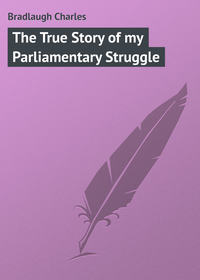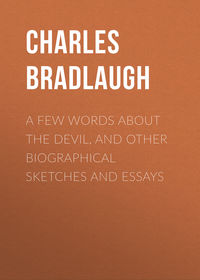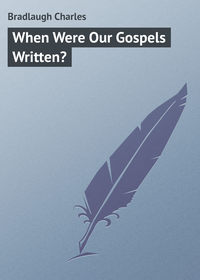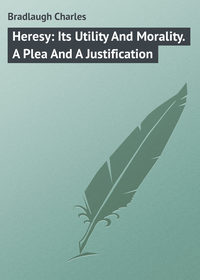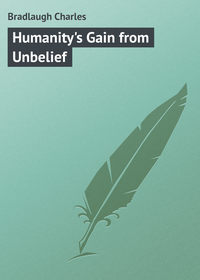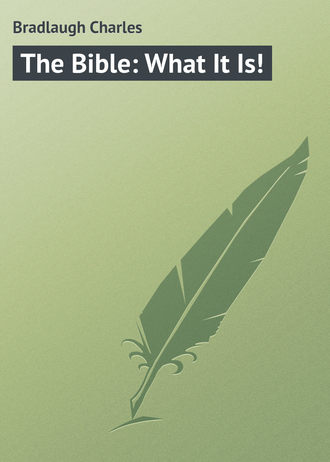 полная версия
полная версияThe Bible: What It Is!
15. – And remember that thou wast a servant in the land of Egypt, and that the Lord thy God brought thee out thence through a mighty hand and by a stretched out arm: therefore the Lord thy God commanded thee to keep the Sabbath-day.
Which is the correct reason for sanctifying the Sabbath-day?
Was it because the Lord rested, or because the Lord brought the Israelites out of Egypt on that day? The true believer will devoutly answer, 'The Lord only knows.'
Chapter xxi., vv. 2 to 6. Leviticus, chap, xxv., vv. 44 to 46. In these verses we find slavery acknowledged, and its continuance provided for by the law of God. The offering a slave his liberty on condition that he abandoned his wife whom he loved, and his children who are of his flesh and blood, is a piece of refined cruelty. Perhaps God did not know that a slave was capable of love, perhaps God was not aware that the slave in his hovel may have as true and as warm an affection for his wife and children as the king in his palace, or the noble in his fine mansion. Is a slave a man with a man's passions and feelings, or is he an inferior animal? If the Bible is to be examined before replying to the question, and if we are to govern our mode of answering by the words we find there, it ceases to be a matter for wonder that there are slave States in Christian countries.
It is a beautiful theory this, and worthy of a place in a revelation from an all-wise and all-good God – i. e., that a man may be a religious man and yet keep his brother and sister as male and female slaves, breeding and begetting other slaves. How did this slavery originate? before the flood slaves are not mentioned. If God made all men originally free, how did any become slaves? Verse 6 is contradicted in Leviticus, chap, xxv., w. 39 to 42.
Verses 7 to 11. These verses contain a provision for the sale by a man of his own daughter. And for what purpose? Our translators have endeavoured to hide the real meaning of the text. Verse 7 reads, 'And if a man sell his daughter to be a maid-servant, she shall not go out as the men servants do.'
In the Douay it is, 'If a man sell his daughter to be a servant, she shall not go out as bondwomen are wont to go out.'
The 8th verse in our translation reads – 'If she please not her master, who hath betrothed her to himself, then shall he let her be redeemed to sell her to a strange nation; he shall have no power seeing he hath dealt deceitfully with her.' In the Douay, 'If she displease the eyes of her master to whom she was delivered, he shall let her go, but he shall have no power to sell her to a foreign nation if he despise her? In the Breeches Bible the whole truth is revealed, for we find the last words of the 8th verse translated, 'seeing he hath deflowered her.'
Lest there should be a mistake, I will further contrast the translation of verse 10. In our version it is, 'If he take him another wife her food, her raiment, and her duty of marriage he shall not diminish.'
In the Douay, 'If he take another wife for him, he shall provide her a marriage, and raiment, neither shall he refuse the price of her chastity.'
In the Breeches Bible, 'If he take him another wife, he shall not diminish her food, her raiment, and recompense of her virginity?
Can any man doubt as to the real meaning of these verses? Is it not clear and beyond contradiction that here is a law professedly from a God of truth and purity, rendering it lawful for a man to prostitute his own daughter. Our translators have cleverly glossed the text, partially hiding its disgusting meaning, but still enough was left to excite suspicion. I have investigated it, and now lay the result before you, and ask you one and all is this the Book from which you let your little girls read, and from which you expect them to acquire that knowledge which shall render them happy and virtuous?
I have already remarked upon the recognition of slavery by God. We have seen how Ishmael was not allowed to participate in the promised land, because he was born a slave. But it remained for us to read more of this Bible before we discovered that a just God, who is no respector of persons, who is the father of us all, who loves the whole world, and who looks alike upon king and peasant, could make such a regulation as the following: —
Verses 20 and 21. 'And if a man smite his servant, or his maid, with a rod, and he die under his hand, he shall surely be punished. Notwithstanding, if he continue for a day or two, he shall not be punished, for he is his money.' We are here told that if one of God's children, whom God caused to be born free, kills another of God's children, whom God has caused to be born a slave, the murderer shall escape punishment, if (as the Douay quaintly expresses it) the party remain alive a day or two after the infliction of the punishment, which was the primary cause of death. Why is this mercy? is it because God so loves all the world that he does not wish to shed the blood of any man? No: but because the slave killed is the murderer's money. He (the murderer) bought and paid for that slave with bright gold and the power of gold is recognised even in the kingdom of God. To-day the Society for Suppression of Cruelty to Animals would prosecute and obtain the committal to prison of any man, who, on such prosecution, should be found guilty of beating his horse or his dog, so that it died on the second or third day. It would be no defence to urge on the part of the prisoner that he had paid for the ill-used animal. The whole auditory would hiss the advocate who raised such a defence. But in a trial at the last day before the Supreme Judge, when a 'Legree' is accused of the murder of an 'Uncle Tom,' may raise a valid defence with the words, 'He was my money.' The power of gold will open the gates of heaven to the murderer, who can look complacently down into hell upon the murderers who had no money.
Chapter xxii., v. ll. Here oaths are commanded; in Matthew, chap. v., w. 34 to 37, and James, chap, v., v. 12, they are forbidden.
Verse 18. 'Thou shalt not suffer a witch to live.' In the Douay, 'Wizards thou shalt not suffer to live.' Can we wonder that our criminal courts occasionally reveal a scene of life in which we see one man parting with his hard-earned pence to propitiate another man, whom he believes to possess some supernatural power? It is customary on such occasions, for the presiding magistrate to deplore the ignorance of the labouring classes, and to exclaim against the folly of believing in witches and wizards, yet he swears the complainant on the Bible, containing this verse, and would refuse to receive his evidence, if, after hearing the magistrate's opinion on the folly of believing in witchcraft, he should happen to remark, 'Then I cannot believe in the Bible.'
Verses 20 and 28, and chap, xxiii., v. 13. Who and what are these Gods, and why these commands? The sole end of this religion is the worship of one God, yet here are other Gods referred to. If I sacrifice to them, I hazard destruction, and if I revile them, I shall fare no better. As for cursing the ruler of my people, I am one of those who deem curses to be vain words, which a man had far better leave unuttered; if the ruler does wrong, let him rule no longer, but let the people place another in his stead.
Chapter xxiv., vv. 9 to 14, are contradicted in chap, xxxiii., v. 20, John, chap, i., v. 18, 1st Epistle of John, chap, iv., v. 12, 1st Epistle to Timothy, chap, i., v. 17, Colossians, chap, i. vv. 15. It cannot be urged that this is figurative, because the evident intention is to give a literal account of seventy-four persons going up to see God. To what place they went up is not clear, it was not the mount, or but a short distance on it, for Moses and Joshua left them, and went up from them into the mount.
In the Hindoo mythology we shall find several instances of Gods, under whose feet paved work may be seen; but these Gods are neither omnipotent, infinite, nor omniscient. All enlightened Christians admit that the whole list of Indian deities is fabulous, and while they gaze on the curious pictures given in the 'Asiatic Researches,' and other works, they feel convinced of the superiority of their own system, which is free from such ridiculous absurdities. But how do these enlightened Christians deal with this chapter, which tells them their 'invisible' God was seen by seventy-four men in a fiery mount, with as it were, a paved work under his feet?
Dr. John Pye Smith, never at a loss, easily reconciles these apparent discrepancies by asserting that they refer to the different persons of the Father and the Messiah, but this is only 'confusion worse confounded,' for it is quite clear that it was not the Messiah who is referred to, either here or in the many other texts speaking of the appearance of the Lord to Abraham, Isaac, and Jacob; it is also clear that Jesus was not invisible; so we are left without aid from the Reverend Dr.'s comment, and must still wonder how an 'invisible' God ever appeared to anybody.
Chapter xxv., v. 30. Here is an absurd and useless regulation. God could not and did not eat this bread.
Verse 40. What patterns were these, and is not Moses supposed to be in the mount when these words were spoken? This verse either refers to a previous interview, of which we have no account, or else this did not take place in the mount at all.
Chapter xxviii., w. 40, 41, and 42. Can anything be more puerile than to imagine the God of the universe giving directions for the particular description of girdle, bonnet, and breeches to be worn by some insignificant puny creatures, crawling on the outside of a little planet called the earth?
Chapter xxix., v. 44. At the very time that God was thus intimating that he would sanctify Aaron, the latter must have been engaged in the manufacture of the calf. Did God know this? If he did, it is hard to understand how he chose an idolator for his priest. If otherwise, God is not omniscient. The family of Levi, who were so severely cursed by Jacob, seem the most favoured by Jacob's God.
Chapter xxx., v. 6. It is not quite clear where this altar was to be placed; but from the text it appears to have been placed in the 'holiest of holies,' which creates a doubt as to how an altar in daily use could be situate in a place only entered once a year. The text is, however, rather complex in its description, and I may be mistaken in my reading.
Verse 15. The words 'when they gave an offering unto the Lord to make atonement for your souls,' are totally omitted in the Douay version.
Verses 22 to 38. God, who is a God of love and full of mercy and loving kindness, here ordains that every man who shall manufacture a particular kind of scented pomatum, shall be put to death. Christian Theist, you tell me that yours is the 'eternal, immortal, and only wise God' (vide 1st Timothy, chap, i., v. 17) – do you in truth believe that he would order me to be utterly cut off because I might perhaps unconsciously make a scented ointment of a particular character? Do you believe if I take a certain description of perfumed pomatum, and 'smell thereto,' previous to rubbing some on the hair of my head, that I shall be put to death? Perhaps these enactments were only meant for the Jews, who seem to have required some strange laws; if so, it is a pity God has allowed the Book to come to us in its present state, as we find it hard to conceive (without any fact to reason upon) that one verse is intended only for the Jews, and the following one intended for the whole world.
Chapter xxxi., v. 15. Moses would never have joined the 'Society for Abolition of Capital Punishment,' if it had been established in his day. This verse must have since become a dead letter, an obsolete statute which God does not enforce in the present age. But if this verse is a dead letter, how much more of the Bible is affected in the same manner? Who is to tell which enactments may be safely disobeyed, and which carry with them the terrible penalty?
V. 17. 'He rested and was refreshed.' Although even the most faithful and pious believer must have great difficulty in attempting to contemplate that stupendous work, the creation of the universe out of nothing, yet this great difficulty sinks into utter insignificance beside the greater one of endeavouring to imagine the omnipotent and immutable Deity resting after his labour, and being refreshed.
V. 18. The expression 'finger of God' is evidently intended to be understood literally here, but the question then arises as to the nature of an infinite spirit without body, parts, or passions (vide thirty-nine articles), yet having fingers, hands, face, and back parts. Dr. Pye Smith says, on the [ – ] (anthropopatheia) of the Scriptures (treatment of God as if possessing a human shape and nature) – 'This is very remarkable and very extensive, but it is manifested by comparison with many other parts of the Scriptures, that the terms employed are terms of condescending comparison with the acts and effects of the thus mentioned organs of the human body, to convey, especially to unpolished men a conception of those properties and actions of God, which to our feeble ideas have a resemblance, and that they were so understood. Language had not then terms for the expression of abstract conceptions.'
The Christian theologian tells me that God created man and all the circumstances that surrounded him, yet speaks of 'human incapacity, and infirmity,' and of 'the language of the Scriptures being formed in condescension thereto.'
Is it not remarkable that the all-wise Creator should have not foreseen the time when the language of his revelation should have sunken below the level of the human capacity? But it is worse than folly to put forward hypotheses as to God's condescension in using such language. The Book itself nowhere suggests such an idea, and I ask to what mind (however 'unpolished' he may be) can the following words convey any other conception of the properties and actions of God than that of the literal reading? —
'And I will take away my hand, and thou shalt see my back parts, but my face shall not be seen.' Dr. Smith says that 'metaphysical or philosophical preciseness is not in the character of Scriptural composition,' yet upon our precise conception of the true meaning of that composition, hangs the penalty of eternal torment.
Chapter xxxii. During the absence of Moses, the Jewish people applied to Aaron to make them other Gods; they used very disrespectful language, saying 'As for this Moses, the man that brought us up out of the land of Egypt, we wot not what is become of him.' Aaron, who had been specially chosen by God to be his priest and Prophet, instead of reminding the people of the miracles God had just performed on their behalf, instead of reproving them for the slighting manner in which they had spoken of his brother Moses, instead even of appealing to Nadab and Abhu, and the seventy elders who had personally seen God so shortly before, and who must all have been impressed with the awful majesty of the Deity, forgetting the first and second commandment contained in chapter xx., w. 3, 4, and 5, and that their God is a jealous God, forgetting also the repetition contained in v. 23 of the same chapter, Aaron (who alone had been nominated to enter the holy of holies), without the slightest attempt at reason or remonstrance, asked the people for their golden earrings, and made a molten calf, and built an altar before it, and proclaimed a feast; and the people said, 'These be thy Gods, O Israel, which brought thee out of the land of Egypt.'
God was very unfortunate in his choice; his chosen people are the first to forget him, or to doubt and deny his power. The miracles performed by Moses and Aaron in Egypt – events any one of which should have been sufficient to have struck terror into the Israelites for the remainder of their lives – the interview between God and the seventy-four, only a few days before, were all forgotten. God having permitted all this to happen, informed Moses thereof, and then uses this remarkable phrase – 'Let me alone that my wrath may wax hot against them, and that I may consume them, and I will make of thee a great nation.' Is this the language of an infinite and immutable Deity?
Moses reasoned with God, and endeavoured to persuade him not to allow his wrath to wax hot, and ultimately the unchangeable changed his mind, and 'repented of the evil he thought to do his people.' The mode of expostulation adopted by Moses is very remarkable (see vv. 11, 12, and 13); one of the chief arguments used is not as to the merits of the case, but as to what the Egyptians will say when they hear about it.
Vv. 15 to 19. Moses, considering that he was so meek a man, soon lost his temper, and the act of throwing down the tables, betrays rather the character of a hasty petulant man.
V. 20. Gold is a metal distinguished by its extreme permanence in air and fire, by its malleability and ductility; it might have been melted by the action of fire, but could not be burnt – i.e., consumed by fire. The Douay says that Moses 'beat it to powder;' this would be impossible, as it is so malleable, that it may be beaten into leaves not more than the 280,000th part of an inch in thickness. Our version says, 'ground it to powder;' this would be a difficult task, unless Moses had other aids than we are aware of. The Golden Calf being reduced to powder, Moses strewed it upon the water, and made the Israelites drink of it. Unless a chloride of gold had been formed by the use of chlorine and nitro-muriatic acid, and of which we have no account, the gold would not be soluble in water, but would sink to the bottom, leaving the water entirely unaffected. After this Moses collected the tribe of Levi, who had been equally guilty with their brethren in the worship of the calf, and set them to slaughter every man his neighbour. In this slaughter there fell, according to our version, 3,000 men, but according to the Douay, 23,000 men were slain. Whichever version is right, it is evident that Aaron, who deserved the most punishment, escaped scot-free. The Lord's vengeance was not satisfied with even this terrible sacrifice of human life; and we are told, in the unique phraseology of the Bible, that 'the Lord plagued the people because they made the calf which Aaron made.'
Chapter xxxiii., vv. 1 to 3, and chap, xxxiv., v. 11. Judea was not a land flowing with milk and honey, and the Lord did not drive out the Canaanite and the other nations mentioned (vide Joshua, chap. xvii., v. 12 and 13; Judges chap, i., vv. 19, and 27 to 35; chap, ii., vv» 20 to 23, and chap, iii., vv. 1 to 6).
Vv. 4, 5, and 6. Why did the Lord want the children of Israel to put off their ornaments? If in any other book than the Bible some shrewd Christians would shake their heads and say, We are afraid Moses and Aaron were not quite honest – first, they deprive the people of their gold earrings under one pretext, and now they defraud them of their remaining trinkets, under the pretence that the Lord commands them to put them off.
Vv. 9 and 10. This 'pillar of cloud' is a favourite shape, and if the whole were an imposture, it would have been an easy matter for Moses by artificial means to have raised a 'pillar of cloud' when he pleased, especially as such precautions were taken to prevent too close an examination by the Israelites.
V. 11. Apart from any question of contradiction (which has been noticed on page 59), is not this verse condemned by itself? Its purpose and meaning is to raise Moses in the estimation of its readers, and to effect this object it degrades the Deity by the very terms it uses, the conversation contained in verses 12 to 20 has all the same tendency, making it appear that Moses was God's favourite, and that God knew his name.
In verse 13, instead of 'show me thy way,' the Douay has 'show me thy face;' this accounts for the expression in v. 20, 'Thou canst not see my face,' but it distinctly contradicts the 'face to face' of verse 11.
V. 23 needs no comment; but I defy any man to read this verse thoughtfully, and yet be filled with awe and admiration for a Deity, who only allows his favoured Prophet to see his 'back parts.' The absurdity is heightened by the remembrance of the many distinct appearances of God to Abraham, Isaac, and Jacob, and shortly before to Moses himself, and seventy-three other persons who all saw God.
Chapter xxxiv., v. 3. The same precaution to prevent detection, if imposture was really being perpetrated.
Verse 6. 'The Lord God merciful and gracious.' When? where? and how? Was it when cursing the first man and woman, and the very ground on which they stood (Genesis, chap, iii.); or when he determined to destroy both man, and beast, and the creeping thing, and the fowls of the air (Genesis, chap, vi., v. 7); or when he rained brimstone and fire upon Sodom and Gomorrah (Genesis, chap, xix., v. 24); or when he slew the firstborn in every family throughout Egypt (Exodus, chap, xii., v. 29); or when he drowned all Pharaoh's army in the Red Sea (Exodus, chap, xiv., v. 27); or when he swore to have war with Amalek from generation to generation (Exodus, chap, xvii., v. 16); or when he killed Nadab and Abihu with fire (Leviticus, chap. x., v. 2); or when he repeatedly attached the penalty of death to the infringement of almost any article of the ceremonial law; or when his fire consumed the people because they complained (Numbers, chap. xi, v. 1); or when he smote them with a great plague (verse 33); or when he ordered the man to be stoned to death who was found gathering sticks on the Sabbath (Numbers, chap, xv., v. 36); or when he causes the earth to swallow Korah, Dathan, and Abiram, and all that appertained to them, and afterwards slew 250 more by fire, and 14,700 more by plague (Numbers, chap, xvi., vv. 31 to 35, and 49); or when he sent fiery serpents to bite his people, so that they died (Numbers, chap, xxi., v. 6); or when he sent the plague, and killed 24,000 of his people (Numbers, chap, xxv., v. 9); or when he directed the terrible slaughter of the Midiantes (Numbers, chap. 31)? I might multiply these texts, but have confined myself to the same Pentateuch in which 'God's mercy, graciousness, and long suffering' are proclaimed by himself. Any reader who wishes further to pursue the subject, is referred to a pamphlet, written in answer to Bishop Watson's 'Apology for the Bible,' and entitled 'The God of the Jews.'
Verse 14. 'The Lord, whose name is jealous, is a jealous God.' My dictionary tells me that to be jealous is to be 'suspiciously vigilant,' 'suspiciously fearful.' The omniscient, omnipotent, and infinite Deity, of what can he be jealous? Perhaps this phrase also is figurative.
Verses 29 and 30. The Douay says that after Moses had talked to the Lord, his face was horned, and that the children of Israel, seeing the horns, were afraid to come near him.
In concluding the comments on the Book of Exodus, I ask what is the result of our investigation? We have found the Book to be thoroughly worthless as a relation of actual occurrences, even when tested under the most favourable auspices; it repeatedly and in important particulars contradicts itself. It cannot be a revelation from God, because it pictures an all-wise God choosing a man with an impediment in his speech, to be a preacher, and relates that when the man hesitated on account of his infirmity, God became angry at a difficulty of his own creation, and which Moses could not help. It represents a just God as seeking to kill (apparently without the slightest cause) the very man whom he had just entrusted with the important mission of releasing his chosen people from bondage; it speaks of an invisible God as becoming visible; of an immutable God as being jealous; of a loving God declaring war against unborn generations of his own creatures; of a just God as punishing the people for following (the teachings of the priest whom he had appointed, and yet allowing the criminal priest not only to escape unpunished, but actually rewarded for his misconduct.) It pictures a merciful and good God as tormenting and murdering the Egyptians, solely for the purpose of convincing the Jews that he is really the Lord God of Israel, and afterwards plagueing and slaughtering those very Israelites, because all the former cruelties practised on their neighbours had not produced sufficient convincing effect on them. It teaches monotheism in one verse, and polytheism in another.


